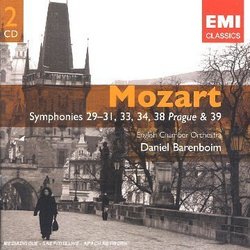| All Artists: Wolfgang Amadeus Mozart, Daniel Barenboim, English Chamber Orchestra Title: Mozart: Symphonies 29, 30, 31, 34, 38 & 39 - Daniel Barenboim, English Chamber Orchestra Members Wishing: 0 Total Copies: 0 Label: EMI Classics Original Release Date: 1/1/2006 Re-Release Date: 5/2/2006 Genre: Classical Styles: Historical Periods, Classical (c.1770-1830), Symphonies Number of Discs: 2 SwapaCD Credits: 2 UPC: 094635091724 |
Search - Wolfgang Amadeus Mozart, Daniel Barenboim, English Chamber Orchestra :: Mozart: Symphonies 29, 30, 31, 34, 38 & 39 - Daniel Barenboim, English Chamber Orchestra
 | Wolfgang Amadeus Mozart, Daniel Barenboim, English Chamber Orchestra Mozart: Symphonies 29, 30, 31, 34, 38 & 39 - Daniel Barenboim, English Chamber Orchestra Genre: Classical
|
Larger Image |
CD Details |
CD ReviewsFleet and beautiful Mozart B. Morris | Richmond, Virginia USA | 07/26/2006 (5 out of 5 stars) "Critics have mostly ignored Barenboim's Mozart, but I cannot understand why. It is always lively and well-detailed. The playing is beautiful, and the interpretations are free of eccentricity. This set is a true bargain!" Luscious David Saemann | 11/28/2008 (5 out of 5 stars) "Barenboim was in his 20's when these recordings were made between 1966 and 71. On reflection, the results are altogether remarkable. Barenboim already was a Mozart stylist of the highest order, and these recordings can take their place among the finest cycles of these works. One of the joys is the playing of the English Chamber Orchestra. They were at one of their peaks during this era, recording prolifically for Raymond Leppard, Benjamin Britten, and Barenboim. The strings are deliciously nimble and rich toned, even if they play with more vibrato than we are accustomed to in Mozart nowadays. The winds and horns are pretty sensational, with the lone exception of two very reedy oboes. Barenboim's tempos are almost always reasonable, with the rare exceptions of some very slow slow movements, proving that he already was the musician we've come to know and accept. Perhaps the strongest performance, and also the earliest, is the Prague, full of architectonic strength. No. 39 features some beautiful wind ensemble, while No. 29 opens with absolutely ideal string phrasing. There definitely is something to be gained by having a prodigy interpret the music of another prodigy. I will return to these recordings often with pleasure." Lively, bracing Mozart, but we're skimming the surface Santa Fe Listener | Santa Fe, NM USA | 02/24/2007 (4 out of 5 stars) "Barenboim was still a young man when he conducted the English Chamber Orch. in scads of Mozart, and at the time (60s and 70s) British critics had lots of good to say. The leaner sound of a chamber orchestra brought out Mozart's wonderful solo writing for winds, so often buried in the then-customary large orchestra versions. As pure sound, these readings stand up well. We get to hear the outstanding solo players of the ECO, caught in good, close-up sound.
And, as the brief review states below, these performances are lively, attentive to detail, and completely without eccentricity. At the same time, however, no single reading made me think that it was one of the best. Nothing proceeds amiss--Barenboim has more vigor and life in him than, say, Neville Marriner, his closest competition at the time. But compare these robust, unsubtle readings to Bruno Walter, Otto Klemperer, Furtwangler, Bernstein, et al (working with big orchestras, of course), and it becomes clear where real involvement and emotional delight come into play." |

 Track Listings (15) - Disc #1
Track Listings (15) - Disc #1